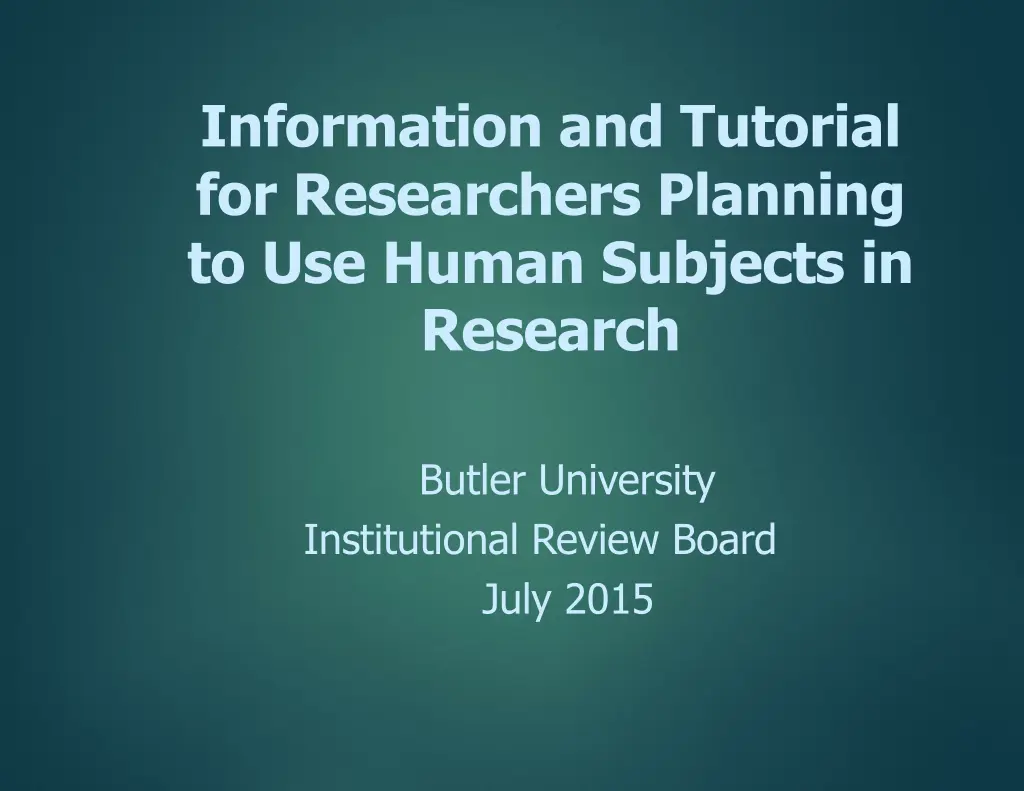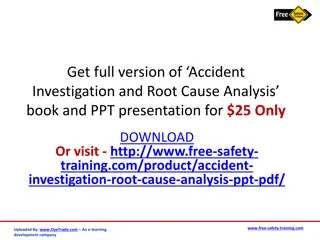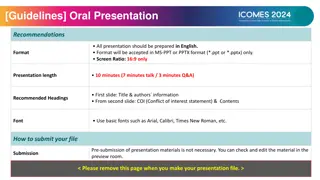
Understanding Institutional Review Boards for Human Subjects Research
Learn about the purpose, process, and criteria of Institutional Review Boards (IRBs) for researchers planning to conduct studies involving human subjects. Discover the importance of IRB approval and the safeguards in place to protect research participants' rights and welfare.
Uploaded on | 0 Views
Download Presentation

Please find below an Image/Link to download the presentation.
The content on the website is provided AS IS for your information and personal use only. It may not be sold, licensed, or shared on other websites without obtaining consent from the author. If you encounter any issues during the download, it is possible that the publisher has removed the file from their server.
You are allowed to download the files provided on this website for personal or commercial use, subject to the condition that they are used lawfully. All files are the property of their respective owners.
The content on the website is provided AS IS for your information and personal use only. It may not be sold, licensed, or shared on other websites without obtaining consent from the author.
E N D
Presentation Transcript
Information and Tutorial for Researchers Planning to Use Human Subjects in Research Butler University Institutional Review Board July 2015
Purpose of the Institutional Review Board We are an administrative body required by the Federal government to protect the rights and welfare of people who are recruited to be participants in research. We review all research involving Human Subjects by Butler University students, faculty, and staff, as well as research by those outside of Butler University who wish to recruit research participants at our institution.
Reciprocal IRB Requirements If you are conducting research at and/or for another institution, such as a school, college or university, or health care organization (hospital, clinic), you must submit to that organization's IRB, as well. Research cannot be approved by Butler University until we receive notice of approval from the reciprocal institution, but we can review your IRB proposal while it is also under review elsewhere.
Research Reviewed by IRB Research Human Subjects Systematic Living individuals about whom an investigator obtains identifiable private information OR data through an intervention or interaction. investigation designed to develop or contribute to generalizable knowledge. IRB Review
Criteria for IRB Approval The risks to subjects are minimized as much as possible. The risks to subjects are reasonable in relation to anticipated benefits. The informed consent is adequate. Where appropriate, the research plan makes provisions for the safety of the subjects during the data collection process. Where appropriate, there are adequate provisions to protect the privacy of subjects and maintain confidentiality of data. Appropriate safeguards are included within the study to protect the rights and welfare of the vulnerable subjects. 1. 2. 3. 4. 5. 6.
Research that Qualifies for IRB Review Essentially, any research using human subjects that eventually will be publicly presented or published, qualifies as research. For example, research conducted in "common educational settings using common educational practices," but will be presented publicly as a report or publication, falls under the review of the IRB.
Why have an IRB? The IRB is established to protect the rights and welfare of human subjects. Previous incidents of unethical research that harmed human subjects led to government regulations for establishing legal protections.
A Bit of History Nuremberg Code (1946): Resulted from a U.S. military tribunal of German physicians who had conducted experiments during WWII on captives. From this we derived requirements for voluntary participation, documented consent, and proof that benefits must outweigh risks to subjects.
History (continued) Thalidomide tragedy (1950's): Unapproved drug taken during pregnancy to help with nausea and sleep led to deformed babies. This led to strict FDA regulations for drug requirements and testing on humans that are still in place today. Declaration of Helsinki (1964): International standards were set to protect human subjects so that the risks did not exceed "the benefits to humanity." Also led to the requirement of an independent review board for research (this became the IRB).
A Prominent Contemporary Case Tuskegee experiment (1932-72): Low-income African-American males infected with syphilis were observed by the U.S. Public Health Service in a longitudinal study to document the progression of the disease. Subjects were not given the known cure for the disease (penicillin) EVEN AFTER IT BECAME AVAILABLE in the 1950s. Risks were increased and vulnerable publics were used for research that benefits a larger general population.
Development of the Law Lessons learned from this tragic case in Tuskegee (and other cases) led to some of our distinctions and protections of special populations as outlined in the Belmont Report and in the National Research Act (1974). The Belmont Report established three basic ethical principles respect for persons, beneficence and justice the foundation for regulations involving human subjects. Source: DHHS and http://www.iupui.edu/%7Eresgrad/Human%20Subjects/StartPage.html
Key Concepts derived from the Belmont Report 1. Respect for Persons 2. Beneficence 3. Justice
Principle 1 Application Respect for persons Informed consent Subjects, to the degree that they are capable, must be given the opportunity to choose what shall or shall not happen to them Individuals should be treated as autonomous agents Persons with diminished autonomy are entitled to protection
Elements of Informed Consent Information Comprehension Voluntariness
Principle 2 Application Beneficence Assessment of risks and benefits Human subjects should not be harmed The nature and scope of risks and benefits must be assessed in a systematic manner Research should maximize possible benefits and minimize possible harms.
Principle 3 Application Justice Selection of subjects There must be fair procedures and outcomes in the selection of research subjects The benefits and risks of research must be distributed fairly.
Typical Research Reviewed by Butler University s IRB Psychology experiments (example: testing the effects of empathy versus informational appeals on message recall) Biomedical research (example: comparing finger prick versus forearm prick for tests, administering drugs) Surveys (examples: Interviewing pharmacy patients, interviewing newspaper subscribers)
Research Examples (continued) Observation (example: watching children on a playground respond to different teacher interventions) Depth interviews (example: interviewing Polish immigrants in America)
Research Examples (continued) Retrospective chart review (example: examining diabetic patients' charts to identify the prevalence of drugs prescribed for illnesses other than diabetes--using existing data) Prospective chart review (example: using a set of patient characteristics to identify a sample for reviewing charts of future patients to a clinic--collecting new data)
Research Examples (continued) Chronicling the lives of homeless people through video documentary Educational, psychological, or cognitive tests Comparison of educational techniques (dance instruction, multi-cultural music education program)
Key Research Terms: Definitions (A-Z) Anonymity: Assurance that no one, not even the researcher, knows whose responses have been recorded in a study. Confidentiality: Assurance that only the researcher knows who belongs to the data; that a third party who somehow gained access to the data would not be able to make a link between the subject and the data recorded from that subject. The IRB is particularly interested if you plan to keep subject identifiers (name, telephone number or student ID, patient chart number, etc.) on data collection forms (such as the survey instrument), and if so, why it is necessary. If identifiers are maintained and links to the subject can be made, then the IRB is interested in how you plan to store the data to ensure that a third party could not have access to the data.
Key Terms (continued) Data: Anything that is observed, recorded in a study (e.g., blood, pictures, responses to questions, HIV status, emotional reactions to a stimulus, etc.). Informed consent: legal representative) voluntarily confirms his or her willingness to participate in a particular research project, after having been informed of all aspects of the research that are relevant to the subject s decision to participate. An ongoing process by which a subject (or his/her Research participants should be fully informed of the procedures to which they will be exposed (or debriefed at the end if some deception is necessary in the execution of the study) and the potential risk (if any) of their participation. Documentation of informed consent is required in most experimental research, biomedical research, and survey research. In cases in which documented informed consent (subject signs form) is not possible, a request to waive that requirement may be filed with the IRB. If you wish to recruit children in your research, you will also need parental consent for each child participant, as well as the children s consent if of age of assent. If your study requires informed consent, then enclose consent form with your proposal.
Key Terms (continued) Maintenance of records: The University, the IRB and the Researcher must maintain appropriate records for three years after the termination of the study. IRB is also interested in how data will be stored to protect subjects' identity.
Key Terms (continued) Principal Investigator: The PI is the lead researcher. Students cannot be PIs--a staff or faculty member employed by Butler ultimately is responsible for ensuring the approved protocol is followed and complying with all IRB policies. Student researchers sign IRB proposals, but the faculty adviser is the PI. The PI must also report to the IRB any unexpected adverse effects as a result of the research. If applying to another institution for IRB approval, the PI will have to be a staff member of that institution. The PI for the Butler application may differ from the PI for your IU Hospitals IRB application, for example.
Key Terms (continued) Research instrument: The form used to collect data, such as a code sheet, a questionnaire, etc. These must be completed and included with your IRB proposal. Research protocol: A written description of the involvement of humans in the research project and the measures to protect them from risk. Risk: Refers to potential harm to subjects as a result of the study procedures. Harm could be physical, emotional, legal, financial, or reputation, for example.
Key Terms (continued) Sample: The group of individuals you will study (via survey, experiment, observation, medical chart review, etc.) that is a subgroup of a specific population (or universe). Vulnerable Publics/ populations: may be easily coerced without protections, who may not be able to provide fully informed consent, or who may be unusually affected by some research interventions (prisoners, children, pregnant women, cognitively impaired, and fetuses- -DHHS). These individuals who
Types of IRB Review and Timetable Exempt (requires 1 reviewer; expect 5 working days from first business day after receipt of proposal) Expedited (requires 2 reviewers, expect 5-10 working days from business day after receipt of proposal) Full (requires full committee review, expect 15-20 days from first business day after receipt of proposal)
Exempt Review After reading descriptions of the following conditions, and you believe you qualify for Exempt Review, it does NOT mean you do not submit a proposal. If the IRB grants Exempt status for your proposal, it means you do not have reporting and follow-up requirements as do the Expedited and Full Review categories. The IRB makes the final determination about the status of a research proposal, whether it be Exempt, Expedited, or Full.
Research involving human subjects qualifies for EXEMPT REVIEW if it satisfies one or more of the conditions listed below: Research conducted in established or commonly accepted educational settings, involving normal education practices. Research on regular and special educational instructional strategies. Research on the effectiveness of or the comparison among, instructional techniques, curricula, or classroom management methods.
Exempt (continued) Research involving use of educational tests (cognitive, diagnostic, aptitude, achievement), UNLESS information obtained is recorded in such a manner that human subjects can be identified, directly or through identifiers linked to the subjects. any disclosure of the human subjects' responses outside of the research could reasonably place the subjects at risk of criminal or civil liability or be damaging to the subjects' financial standing, employability, or reputation.
Exempt (Continued) Research involving survey, observational, or interview procedures is usually Exempt, except where ALL THREE of the following conditions exist: responses are recorded in such a manner that the human subjects can be identified, directly or through identifiers linked to the subjects. responses if known outside the research, could reasonably place the subject or respondent at risk of criminal or civil liability or be damaging to the subjects' financial standing or employability. the research deals with sensitive aspects of the subject's own behavior, such as illegal conduct, drug use, sexual behavior, or use of alcohol.
Exempt (continued) NOTE: All research involving survey or interview procedures is considered "exempt" when the respondents are elected or appointed public officials or candidates for public office.
Exempt (continued) Research involving the observation (including observation by participants) of public behavior. Research involving the collection or study of existing data, documents, records, pathological specimens, or diagnostic specimens, if these sources are publicly available or if the information is recorded by the investigator in such manner that subjects cannot be identified directly or through identifiers linked to the subjects.
Exempt (continued) Research and demonstration projects which are conducted by or subject to the approval of department or agency heads, and which are designed to study, evaluate, or otherwise, examine a variety of approved programs. Visit our website for the complete categories: http://legacy.butler.edu/research- scholarship/compliance/review- board/policies-procedures/
Exempt (continued) The Exempt Review proposal form can be downloaded on the Butler University IRB website: http://legacy.butler.edu/research- scholarship/compliance/review-board/application- forms/
Expedited Review Category The IRB may use an expedited review procedure for research that involves no more than minimal risk to the subjects and in which the only involvement of human subjects will be in one or more of the categories listed in the following slides. The IRB chair and at least two members of the IRB conduct expedited reviews. Expedited review may be appropriate for requests of minor changes in previously approved research during the period for which approval is authorized.
Expedited Review (continued) The following research types are typical of Expedited Review at Butler. For a complete list of approved expedited categories, see visit our website: http://legacy.butler.edu/research- scholarship/compliance/review-board/policies- procedures/
Expedited Review (continued) Video/audio recordings made for research purposes such as investigations of speech defects. The study of existing data, documents, records, pathological specimens, or diagnostic specimens. Research on individual or group behavior or characteristics of individuals, such as studies of perception, cognition, game theory, or test development, where the research investigator does not manipulate subjects' behavior and the research will not involve stress to subjects.
Expedited Review (continued) Survey or observational research, educational tests, and reviews of existing data that do not qualify for Exempt Review (see previous slides for specifics) Any other category specifically added to this list by the Department of Health and Human Services and published in the Federal Register.
Expedited Review Follow- up The PI must maintain the research records for a minimum of three years after closure. The PI must inform the IRB when the data collection is complete. The PI also require to submit the renewal before the research is expired. The IRB proposal form for Expedited and Full Review is the same document (access it at www.butler.edu/birs/compliance/IRB_application_forms.htm).
Full Review When two members of the IRB determine a research proposal involves more than a minimal risk to the subjects and it does not fall with in the expedited review category, the proposal is referred to the IRB for full review. In such cases, the researcher may be required to submit additional information necessary to perform the risk/benefit analysis.
Full Review (continued) In any Full Review case involving research that places human subjects at more than minimal risk, a series of safeguards must be in place to ensure research participants will have full understanding of the procedures prior to giving consent . The IRB will want to ensure that risks to human subjects are minimized. Also, risks to subjects should be deemed reasonable in relation to anticipated benefits, if any, to subjects, and the importance of knowledge that may reasonably be expected to result from the research.
Procedures for Applying to the IRB 1. Access http://legacy.butler.edu/research- scholarship/compliance/review-board/application-forms/ 2. Identify and download appropriate form for review category. 3. Complete form and obtain proper signatures. 4. Attach all completed instruments (such as questionnaires or data collection sheets) you will be employing in your study.
IRB Application Procedures (continued) 5. Attach completed consent forms required for your study. 6. Email the application to irb@butler.edu, OR, Take the packet to the University Research Programs office in Jordan Hall. 5. You may not begin collecting data until you receive approval from the IRB at Butler, and any other IRB to which you have applied.
IRB Application Procedures (continued) 8. Upon receipt of IRB approval, begin data collection. 9. Submit the renewal before the research is expired. 10.Report to the IRB when data collection is completed (if Expedited or Full review status). NOTE: If you have a tight time-frame for collecting data, make sure you allow enough time (and not just the minimum required) for IRB review. example, it may take five days to review your proposal, but the IRB may request more explanation or a revised consent form, which will add a little time onto the review period. For
Investigator requirements PI eligibility Only a staff or faculty member employed by Butler ultimately who is eligible to serve as a Principal Investigator. CITI Completion All investigators involve in the research are required to complete CITI training every three years. Please visit ww.citiprogram.org Please complete Either the Course Social Behavior Researcher or Biomedical Researcher .
IRB Application Procedures (continued) If you have questions about your application, please do not hesitate to contact us at irb@butler.edu Kanti Crain Research Compliance Officer kcrain@butler edu Taura Edwards Director of Butler Institute for Research & Scholarship tbedward@butler.edu Joel Martin, Ph.D IRB Chair jmmarti1@butler.edu






















